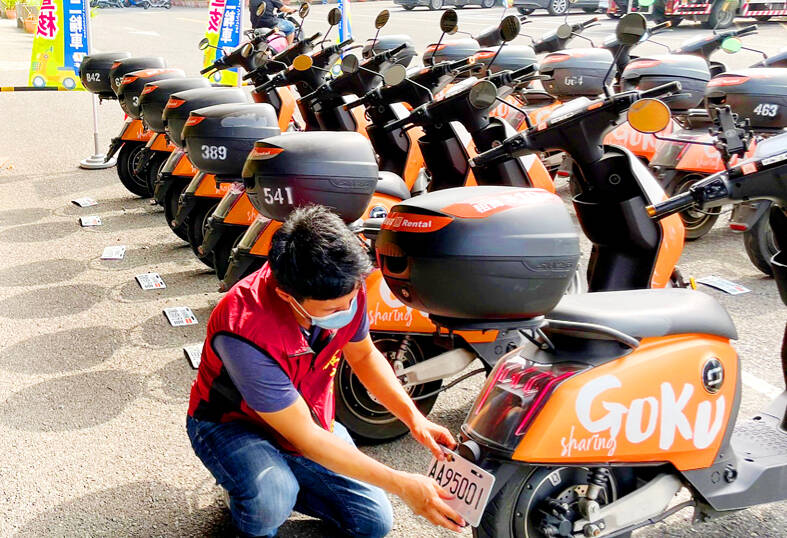Owners of electric bicycles would be required to register their bike, obtain a license plate and buy insurance before using public roads, as revisions to traffic rules covering the bikes took effect yesterday.
The revisions to the Road Traffic Management and Penalty Act (道路交通管理處罰) designate e-bikes as “mini electric two-wheel vehicles” that cannot be operated without a license plate.
E-bike owners would have to formally register their vehicle and purchase at least three years of compulsory automobile liability insurance at a cost of at least NT$1,358 for a newly purchased bike. Previously bought vehicles can be operated with shorter insurance coverage. Bikes purchased within the past year, for instance, would require two years of coverage for at least NT$971.

Photo: Huang Liang-chieh, Taipei Times
For e-bikes purchased before Nov. 1, owners would have a grace period of two years to register and buy insurance.
There are about 200,000 e-bikes in Taiwan, and owners who fail to register them would be subject to fines of NT$1,200 to NT$3,600 and be barred from using them.
The minimum age for riding an e-bike is 14. Riders must wear a helmet and the speed limit is 25kph.
E-bike riders are also forbidden to carry passengers, make unauthorized modifications, or ride them on sidewalks or regular bike lanes, except in riverside parks.
The new regulations came after an increase in the number of crashes involving e-bikes and concerns that they pose a heightened risk to minors, lawmakers have said.
Experts have said that the new legal status for e-bikes would also clarify what owners would be eligible to if their bike is stolen and help the vehicles find a market niche.
Ko Chun-pin (柯俊斌), chairman of the Taiwan Transportation Vehicle Manufacturers’ Association’s motorcycle manufacturing division, said the government might provide subsidies for e-bikes as part of its campaign to promote environmentally friendly vehicles.
Taiwanese firms manufacture a combined 80,000 to 100,000 e-bikes each year, with about 80 percent of them being sold to migrant workers, Ko said.

The Chinese military has built landing bridge ships designed to expand its amphibious options for a potential assault on Taiwan, but their combat effectiveness is limited due to their high vulnerability, a defense expert said in an analysis published on Monday. Shen Ming-shih (沈明室), a research fellow at the Institute for National Defense and Security Research, said that the deployment of such vessels as part of the Chinese People’s Liberation Army (PLA) Navy’s East Sea Fleet signals a strong focus on Taiwan. However, the ships are highly vulnerable to precision strikes, which means they could be destroyed before they achieve their intended

The Taiwan Experience Education Program (TEEP) has funded short-term internships in Taiwan for more than 4,500 young people from more than 40 countries since 2015, with the goal of attracting and retaining international talent, the Ministry of Education said yesterday. Fifty-five colleges launched 514 projects this year, including in fields such as semiconductors, artificial intelligence, medicine and biotechnology, green energy, and sustainability, it said. The program provides research and practical internships in Taiwan for two to six months, and offers cultural exchange and networking opportunities, the ministry said. For example, National Formosa University’s Embedded System and Autopilot Laboratory developed two solar-powered drones in

GLOBAL: Although Matsu has limited capacity for large numbers of domestic tourists, it would be a great high-end destination for international travelers, an official said Lienchiang County’s (Matsu) unique landscape and Cold War history give it great potential to be marketed as a destination for international travelers, Tourism Administration Director General Chen Yu-hsiu (陳玉秀) said at the weekend. Tourism officials traveled to the outlying island for the Matsu Biennial, an art festival that started on Friday to celebrate Matsu’s culture, history and landscape. Travelers to Matsu, which lies about 190km northwest of Taipei, must fly or take the state-run New Taima passenger ship. However, flights are often canceled during fog season from April to June. Chen spoke about her vision to promote Matsu as a tourist attraction in

Taipei resident Mu Chu-hua caught some glimpses of China’s mighty military parade on YouTube on Wednesday. As she watched hypersonic missiles roll down Beijing’s Changan Avenue and troops march in lockstep, she did not feel like they posed a threat to Taiwan. Mu, a 69-year-old retiree, said she saw the parade as simply a way for Chinese President Xi Jinping (習近平) to “say thank you to the troops.” “I thought it was quite normal,” she said. “It was very cool.” China’s military parade commemorating the end of World War II was being watched internationally for insights into Beijing’s military advances and its show